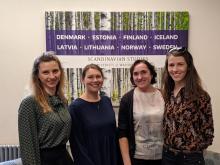Greetings!
The UW Baltic Studies Program enters the 2022-2023 academic year with much energy and optimism. Lithuanian lecturer Inga Daraškienė writes,
"This autumn, a nice group of students started learning the Lithuanian language. It is exciting to see growing interest in this course. The Lithuanian language is a heritage language for many students willing to speak their parents' and grandparents' language. To know Lithuanian means more than learning a new language; it is a stronger connection with their families, relatives, and culture. And it is more exciting that for American students, the Lithuanian language is a key to exploring the Baltic region".
Guntis Šmidchens is teaching first-year Estonian.
“We have some really super students in the Estonian class,” he writes. “They came in with a solid background in science and engineering, and their mathematical thinking is perfect for navigating the patterns of Estonian verb and noun endings!”
In Fall Quarter 2022, Guntis is substituting for Latvian lecturer Solvita Burr, who is on leave until December. Guntis writes that this year’s Latvian students are highly motivated, and they push him to cover as much as possible, as quickly as possible:
“I was overjoyed to learn that they’re grammar geeks like me. This Latvian class is a perfect opportunity to continue a project that I’ve dreamed about for a long time: Editing, updating and expanding a new edition of the innovative textbook written four decades ago by the American linguist, Joseph Lelis.”
Over the coming year, Inga, Solvita and Guntis are also teaching English-language courses about Lithuanian, Latvian and Estonian culture and history. In fall quarter, for example, Guntis is teaching “Introduction to Scandinavian Cultural History,” a broad topic that covers the eight-country region as mapped by the UW Department of Scandinavian Studies:
“It’s fascinating to discover convergences between our world and theirs... American students weep when they read the classic Lithuanian children’s story about the death of the dog named Brisius. They open their hearts to the enchanting beauty of Estonian choral songs. And then they read the recent novel, Doom ’94, to discover that young people in Latvia are also into Seattle grunge music and Nordic metal rock!”
A few months have passed since May 2022, when the University of Washington hosted the international Conference on Baltic Studies (a biennial meeting of AABS, the Association for the Advancement of Baltic Studies). About 300 scholars from North America, Europe, and Asia presented papers on myriad topics in Baltic history, politics, anthropology and sociology, literature, linguistics, musicology, library science, media studies and more. Events were open to UW faculty and students, and meeting rooms were often full to capacity. The conference’s most heavily attended panel was a lunchtime discussion about Russia’s invasion of Ukraine. Special events included explorations of Baltic connections to the Indigenous peoples of North America; a reading of Baltic poetry and prose; and analysis of intensifying political and economic relations between the Baltic countries and Taiwan. On the conference’s closing day, a panel of Ambassadors and Embassy representatives engaged cutting-edge news on political developments. If you missed the conference, no worries! Videorecordings of the main events are now available on the AABS YouTube channel.
Also, please consider joining our department’s community list-serv, the Snowball -- JOIN SNOWBALL -- to keep apprised of all we have going on. We hope to see you at an upcoming event!
UW‘s Lithuanian lectureship receives generous funding from the Lithuanian Academic Scheme for International Cooperation in Baltic Studies, in collaboration with Vilnius University and Lithuania‘s Ministry of Science and Education. UW‘s Latvian Lectureship is jointly funded by UW College of Arts and Sciences and the Latvian Language Agency.
All of the courses and events mentioned above were enriched and enhanced by hundreds of individuals and organizations who donated (and continue to donate) to the the UW Baltic Studies Program‘s endowment funds. Since the Program‘s beginning in 1994, thanks to steadily growing endowment income, the Scandinavian Department has expanded Baltic faculty from one part-time lecturer to an associate professor and two full time lecturers who teach all three Baltic languages as well as other courses about Baltic history, culture and politics; donations help pay for guest speakers; supplement the UW Libraries budget for Baltic books; and provide stipends to promising Baltic Studies students. As we approach the program‘s thirtieth anniversary in 2024, please consider a donation to the Friends of Scandinavian Languages & Literature Fund to help support this and all our other Scandinavian Studies Department programs!
With best wishes for 2023,

Guntis Šmidchens
Kazickas Family Endowed Professor in Baltic Studies


Solvita Burr Inga Daraškienė
Visiting Lecturer of Latvian Visiting Lecturer of Lithuanian
